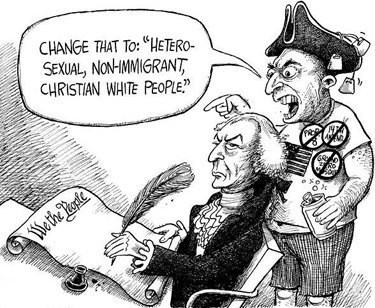General Discussion
Related: Editorials & Other Articles, Issue Forums, Alliance Forums, Region Forumsjeff47
(26,549 posts)magellan
(13,257 posts)Either way, they were the ones who would have been happy to continue as British subjects as long as they could go back to the good old days of salutary neglect.
ChairmanAgnostic
(28,017 posts)Ben and he did not speaketh for decades.
magellan
(13,257 posts)Imagine knowing your father will be hanged for treason in the eventuality Britain wins the war. And then trying to reconcile?
Exile back to Britain was too good for him.
ChairmanAgnostic
(28,017 posts)those not centered around London. Think scots, welsh, irish, and anyone not wearing a title) Ben was a hero. Throughout the colonies, he was a highly respected figure. But for many political leaders, he was a pain in the ass. His insistance on some sort of republic, on leaving the crown, and on having free sex and other unbelievably liberal ideals only made his significant scientific and social findings that much more spicy and interesting. He was a true renaissance man. Even now his letters and articles hold a great deal of wit and wisdom.
Donald Ian Rankin
(13,598 posts)In many respects, the far right is far closer to the original vision of the founding fathers than liberals are. There's a reason left-wingers are called "progressives".
kona808
(41 posts)White male landowners.
So ya, that's probably pretty accurate.
HooptieWagon
(17,064 posts)Newest Reality
(12,712 posts)had they been at the original, Boston Tea Party, I could see them getting confused and throwing each other into the harbor.
It would have been a short-lived and easily forgotten event.
ieoeja
(9,748 posts)When the British Gov't told the colony it would have to purchase the tea, like it or not, the colony sent their lawyers to court. The British courts sided with the colony, ruling the mandate illegal.
In the meantime....
The original Tea Partiers had what they thought was a brilliant idea: the colony could not be forced to purchase the tea if the tea did not exist! When they destroyed the tea, the British Gov't sent their lawyers to court. The British courts ruled that, while the mandated purchase would have been illegal, the colony was liable for the safety of the British East Indies Tea Company ship while in the colony's harbour.
So the intent of the Boston Tea Party was to save the colony from having to pay for the tea. But ended up forcing the colony to pay for the tea. In its original intent it was a colossal failure.
But it did prove to be a progranda coup.
Buns_of_Fire
(17,187 posts)wandy
(3,539 posts)http://en.wikipedia.org/wiki/East_India_Company
The only difference is that the astroturf movement today works for companies trading mainly in oil, pharmaceuticals and military hardware.
johnsolaris
(220 posts)Hi,
They were around & were the Slave owners. That is why the slaves were not counted as a whole person. Look it up.
ieoeja
(9,748 posts)Representation was apportioned by population. As the representatives were only elected by those enfranchised, they would be expected to represent only those people. Given the assumption that an enfranchised man would want society to care for his loved ones, nobody** argued that the disenfranchised should not be counted.
On the other hand, some of those same men wanted society to create laws that forced their slaves to live in bondage. Clearly, he wanted the government to not care for his slaves. At least for the most part. Those men did argue that they wanted their slave's needs cared for to the extent that they were kept alive to work for him.
The bottom line is that the more slaves were counted, the more power it gave their masters. Had 100% of slaves counted for apportioning Representatives and Electoral Delegates, it is likely those opposed to slavery would have never defeated slavers at the ballot box. The Civil War may have never been fought. And it likely would have been decades longer before slavery ended.
Conversely, had 0% of slaves counted, those opposed to slavery would have controlled the federal government on day one. They wouldn't have immediately freed the slaves knowing that would cause an immediate civil war with the slavers backed by the British. South Carolina, after all, had already surrendered to the British in the first few months of the Revolutionary War, ordered the Continental Army out of the state, then sat out the remainder of the war under British control.
But the Dred Scott decision would not have happened. The Fugitive Slave laws would have never been passed. Roadblocks would have instead been passed making slavery increasingly unviable.
**Or maybe that was argued. I don't know about that. Republican efforts to disenfranchise voters today would certainly come to an abrupt end if representation was based on enfranchisement rather than simple population. But I'm getting off tangent.
Arkana
(24,347 posts)Their authoritarian fetish wouldn't have allowed anything else.
Nye Bevan
(25,406 posts)Last edited Mon May 6, 2013, 06:02 PM - Edit history (1)
That would have sucked.
Warpy
(111,305 posts)were not permitted to vote or hold their own property after marriage.
They'd supported the King during the Revolution and only changed uniforms when they realized the King had lost. Then they talked a good fight while they worked to sabotage the new country.
